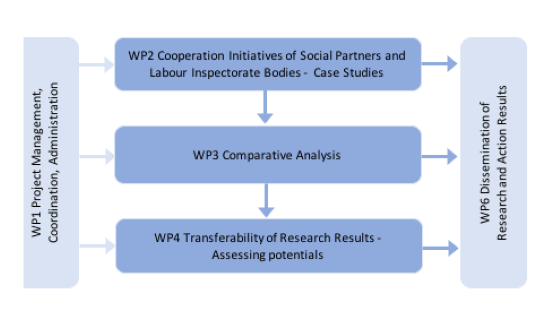The Final Conference of the SPLIN Project (online)
took place on February 11, 2021, 10:00-16:00 CET
Safeguarding labour standards through co-enforcement
Cooperación entre los agentes sociales y la inspección de Trabajo frente al empleo irregular (co-enforcement)
Ochrona standardów pracy przez współ-egzekwowanie (co-enforcement)
Sicherung von Arbeitsstandards durch Co-enforcement
Conference Programme: english, español, polska, deutsch
The SPLIN Project
SPLIN scrutinizes two different types of innovative measures for safeguarding fair working conditions, involving both social partners and labour inspectorates.
1.‘Co-enforcement actions’
… are ongoing coordinated efforts of labour inspectorates and social partners (institutions) to monitor and enforce labour standards (wages, OSH, etc.) in the construction sector in Austria, Spain and Poland. The following case studies have been selected:
- Inspection of underpayment and contractor liability for wages in construction (Bauarbeiter-Urlaubs und Abfertigungskasse, Austria)
The Construction Workers’ Annual Leave and Severance Pay Fund (BUAK) is a statutory body under public law, tasked with the autonomous administration of statutory duties. It also serves as the social partners’ institution in the construction industry, and therefore seeks consensus between employees and employers. BUAK’s main duty is to manage leave and severance pay entitlements, as well as the Bad Weather Compensation for Construction Workers programme.
In 2011, the law to combat wage and social dumping entered into force. BUAK has been approved to carry out checks on underpayment, also in case of posting or cross-border temporary agency work in the construction sector. In addition, they are in charge of inspecting and investigating contractor liability for wages in construction. The BUAK investigates the details on which workers’ pay claims are based and supports employees in calculating the amount of claimed wages and in identifying the client potentially liable for covering the claim.
- Commission on Health and Safety and Hiring Prevention (Fondación Laboral Constucción Asturias, Spain)
In Spain, FLC Asturias has developed a very innovative practice to combat fraud. In 1999, this institution created the “Commission on Health and Safety and Hiring Prevention” (Comisión de Seguridad y Prevención de Riesgos Laborales y Contratación, COPREVAS). Eight professionals work on a full-time basis, having been appointed respectively by trade unions (4) and employers’ organisations (4). They carry out actions to detect and prevent fraud with a special focus on bogus self-employment. The commission has power to freely enter in all the companies where they can check subcontracting books and conduct interviews with both workers and employers. On the basis of the information they obtain during their daily checking, they inform the regional labour and social security inspectorate once a week, according a cooperation agreement signed with the institution. In 2015, 2,942 construction sites were visited and 3,372 inspections were carried out. Thus, the working conditions of over 8,000 workers were revised (President FLC Asturias).
- Agreement for Safety in the Construction Sector (Polish Association of Construction Engineers and Technicians and Chief Labour Inspector, Poland)
In Poland, a permanent Alliance called ‘the Agreement for Safety in the Construction Sector’ was created in 2010. Under the initiative of the Polish Association of Construction Engineers and Technicians and of the Chief Labour Inspector, six of the largest construction companies adopted some common rules in the area of health and safety. The agreement has developed the following actions: standards for minimum requirements towards subcontractors; appendix to subcontracting agreements regarding occupational health and safety; guidelines to the safe works manual; periodical trainings for employees; the obligation to use protective glasses on each site; and the Safety Week which is an annual, common initiative for occupational safety on the Polish market. These initiatives and rules are binding only for the Alliance members. The trade union Budowlani participated in the first consultation sessions before its signing and support the agreement, and cooperates to enforce safety standards agreed upon and develop them further.
2.‘Transnational trade union enforcement action’
The International Transport Workers‘ Federation (ITF) network of inspectors is one of the most significant cases of transnational union bargaining co-ordination. It is in place in the maritime shipping industry. This initiative addresses the particular problems for enforcement and social dumping following the transnationalization of maritime labour markets. The modern Flag of Convenience (FOC) system was the result of an employer strategy to avoid unions and high wage costs by ship owners from high-wage countries. To combat abuse associated to this system, the FOC campaign launched by the ITF achieved the establishment of a global wage bargaining system that enables to set the pattern for pay and working conditions for a significant portion of the global seafaring work-force. The enforcement of the global wage bargaining system concerning the ITF-FOC Campaign is built upon a multi-level transnational network of inspectors employed simultaneously by national unions and the ITF.
This enforcement mechanisms will be researched in three different European countries (Finland, Poland and Spain) that greatly vary in terms wage costs, labour and social standards and degrees of trade union strength. As a result, it will be possible to analyse its practical implementation and effectiveness in highly different national institutional contexts. In addition, SPLIN targets key stakeholders from unions, policy makers and inspectorate bodies from other sectors and countries when assessing the actions’ potential of transferability.
SPLIN PROJECT PLAN

